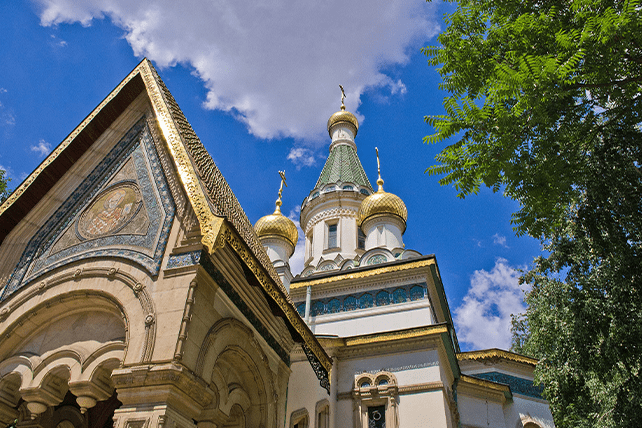(RNS) — After three high-ranking members of the Russian Orthodox Church were expelled from Bulgaria on charges of espionage last month, their former church is not only at the center of a diplomatic rift between the Russian and Bulgarian governments but an ecclesiastical one between the two countries’ Orthodox churches.
On Sept. 21, Bulgarian authorities arrived at the residence of Archimandrite Vassian (archimandrite is the equivalent of an abbot), head of the church of St. Nicholas the Miracle-Maker in Sofia, and informed him and two other priests, both Belarusians, that they were being deported from the country, before shuttling them to the border with Serbia.
According to Bulgaria’s state security service, Vassian and his colleagues had been involved in “the Implementation of various elements of the Russian Federation’s hybrid strategy to purposefully influence socio-political processes in the Republic of Bulgaria in favor of Russian geopolitical interests.”
But in a statement, the Russian Orthodox Church said Bulgaria was acting out of anti-Russian bias. “The expulsion of priests, whose calling is service to God and people and the preaching of peace and brotherhood among nations, is an outrageous act dictated by Russophobic motives and the desire to erase the glorious pages of the common history of Bulgaria and Russia.”
“We are outraged and shocked by what happened,” Russia’s ambassador to Bulgaria, Eleonora Mitrofanova, said. “Their current goal seems to be a break in the relations between the sister Russian and Bulgarian Orthodox churches and the brotherly ties between the Russian and Bulgarian people.”
Bulgaria’s prime minister, Nikolai Denkov, fired back more simply: “Russian priests were not expelled, people who worked against the national interests of Bulgaria were expelled.”
Russian Orthodox clergymen have recently been accused of acting on behalf of the Russian state in the United States.
Last month, Foreign Affairs magazine reported that the FBI had warned Russian and Greek Orthodox parishes in the U.S. that Russian intelligence services may be using their churches to recruit assets. The head of the Russian church in Moscow, Patriarch Kirill, has been accused of having served the KGB since the 1970s and, later, modern Russia’s FSB intelligence service.
“Cooperation between the Moscow Patriarchate at the highest levels and the Russian state is taken for granted by all observers,” Samuel Noble, a scholar of Orthodox Christianity, told Religion News Service.
The two countries’ shared faith has long been a foreign affairs boon for Russia, Noble added. “In Bulgaria, Orthodox Christianity, alongside linguistic and other cultural ties, is often an important source of pro-Russian sentiment, even if the Bulgarian church has been quite divided over Russia even well before its invasion of Ukraine.”
Suspicions that Archimandrite Vassian may have ties with Russian intelligence were first raised in neighboring North Macedonia, where he represented the Russian Orthodox Church as well. Macedonian leaders accused him of working to halt plans by North Macedonia’s branch of Orthodox Christianity to separate itself from the Serbian Patriarchate.
In May of last year, the Ecumenical Patriarchate of Constantinople, which has often acted as a mediator between the Orthodox world’s bishoprics and patriarchates, recognized the Macedonian church’s independence from Moscow, as it had done for Orthodox Church of Ukraine in 2018. The Moscow Patriarchate severed its communion with Constantinople and other aligned patriarchates in retaliation.

